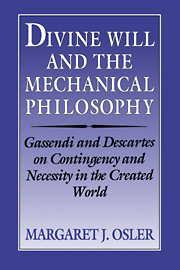 Divine Will and the Mechanical Philosophy
Divine Will and the Mechanical Philosophy Book contents
- Frontmatter
- Contents
- Acknowledgments
- Introduction
- Part I Theology and the philosophy of nature
- 1 Divine power and divine will in the Middle Ages: Historical and conceptual background
- 2 Baptizing Epicurean philosophy: Gassendi on divine will and the philosophy of nature
- 3 Providence and human freedom in Christian Epicureanism: Gassendi on fortune, fate, and divination
- 4 Theology, metaphysics, and epistemology: Gassendi's “science of appearances”
- 5 Eternal truths and the laws of nature: The theological foundations of Descartes' philosophy of nature
- 6 Gassendi and Descartes in conflict
- Part II The mechanical philosophy and the formation of scientific styles
- Bibliography
- Index
1 - Divine power and divine will in the Middle Ages: Historical and conceptual background
Published online by Cambridge University Press: 11 September 2009
- Frontmatter
- Contents
- Acknowledgments
- Introduction
- Part I Theology and the philosophy of nature
- 1 Divine power and divine will in the Middle Ages: Historical and conceptual background
- 2 Baptizing Epicurean philosophy: Gassendi on divine will and the philosophy of nature
- 3 Providence and human freedom in Christian Epicureanism: Gassendi on fortune, fate, and divination
- 4 Theology, metaphysics, and epistemology: Gassendi's “science of appearances”
- 5 Eternal truths and the laws of nature: The theological foundations of Descartes' philosophy of nature
- 6 Gassendi and Descartes in conflict
- Part II The mechanical philosophy and the formation of scientific styles
- Bibliography
- Index
Summary
What indeed has Athens to do with Jerusalem: What concord is there between the Academy and the Church?
Tertullian, On Prescription Against HereticsIf the development of science in Western Europe can be understood, at least in part, as resulting from the coupling of Greek ideas about rationality with biblical notions of God's power, one troublesome offspring of this union was the problem of reconciling two of God's primary attributes, his omnipotence and his omniscience. Although many classical thinkers had considered the cosmos to be governed by rational principles of some kind, their discussions of chance, fate, and fortune had implicitly acknowledged the fact that human life depends on forces beyond rational control. Medieval Christian theologians faced the difficult task of reconciling the Old Testament God of Abraham, Isaac, and Jacob, who created the world and rules it freely according to his own will, with Greek ideas about the self-sufficiency and rationality of cosmic principles – an endeavor memorably characterized by Lovejoy as “perhaps the most extraordinary triumph of self-contradiction.” Tensions between these classical and biblical ideas formed the intellectual context of medieval and early modern discussions about God's relationship to the creation.
In the present chapter, I explore the way God's relationship to the creation was considered in the thirteenth and fourteenth centuries, when it came to be formulated in terms of the dialectic between the absolute and ordained power of God.
- Type
- Chapter
- Information
- Divine Will and the Mechanical PhilosophyGassendi and Descartes on Contingency and Necessity in the Created World, pp. 15 - 35Publisher: Cambridge University PressPrint publication year: 1994


